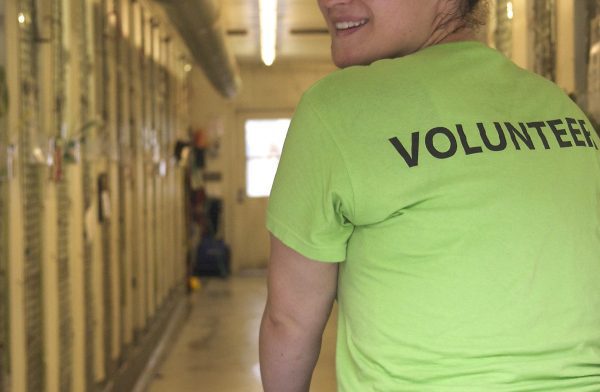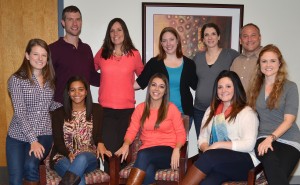Innovative Volunteer Program Assessment Helps Nonprofits Thrive

Effective volunteers are the lifeblood of nonprofit organizations. Without them, nonprofits can wither and even die, so understanding their needs is critical.
“Nonprofits for the most part run on limited resources,” said Steven Rogelberg, University Professor and Director of Organizational Science at UNC Charlotte. “Their scopes and vision are large, but their abilities to impact those are often limited. The volunteers in a nonprofit are really critical for the organizations to fulfill their missions.”
Rogelberg and collaborators have developed an innovative system called the Volunteer Program Assessment to help nonprofits understand and respond to their volunteer programs’ strengths and weaknesses. Since 2009, VPA (vee-pah) has helped over 120 organizations in 20 states address their needs.
 UNC Charlotte developed VPA in partnership with The Humane Society of the United States, which continues to offer essential support and scholarships that allow recipients to receive services for no charge. VPA also has expanded to partner with George Mason University, Illinois State University, Northern Illinois State, University of South Florida and University of Nebraska in Omaha.
UNC Charlotte developed VPA in partnership with The Humane Society of the United States, which continues to offer essential support and scholarships that allow recipients to receive services for no charge. VPA also has expanded to partner with George Mason University, Illinois State University, Northern Illinois State, University of South Florida and University of Nebraska in Omaha.
Faculty and graduate students in UNC Charlotte’s Organizational Science doctoral program guide VPA. Graduate students from the Industrial/Organizational Psychology, Health Psychology, Public Policy, Sociology, and Communication Studies programs, as well as undergraduate students, also volunteer with VPA.
“I think what’s special about VPA is that it’s a three-pronged approach,” Rogelberg said. “Our first area of emphasis is community impact. Our motivation is to help those who help others. Our second prong is student training. We are preparing students to be future leaders in the organizational science discipline as well as helping to inspire them to do community work.”
The third area of emphasis is research.
“When an organization has a volunteer program that’s really humming, it benefits the recipients, the volunteers and the employees,” Rogelberg said. “We always knew volunteers were important, and we conducted research that showed when employees are interacting with effective volunteers, the employees report less stress, more job satisfaction and greater engagement.”
When a volunteer program has problems, on the other hand, organizations see a negative impact on employees, research indicates. Other research projects include investigations of how the use of talent management practices influences volunteer outcomes; structural and leadership characteristics that influence volunteers’ perceptions of their organization; and the role of social media in the nonprofit context.
 VPA began after Rogelberg received a grant in 2008 from The Humane Society of the United States to study volunteer management and practices. He gathered information from 70 nonprofits nationwide and identified key drivers for volunteer engagement and commitment. All of the questions and scales on the VPA survey come from published research.
VPA began after Rogelberg received a grant in 2008 from The Humane Society of the United States to study volunteer management and practices. He gathered information from 70 nonprofits nationwide and identified key drivers for volunteer engagement and commitment. All of the questions and scales on the VPA survey come from published research.
VPA helps organizations sustain volunteers and managers of those volunteers, said Hilary Anne Hager, director of the National Volunteer Center at The Humane Society of the United States.
“Really allowing groups to elevate their game and meet their mission is huge,” Hager said. “Knowing what your volunteers need and having strategies to run an effective program helps (animal) organizations meet their missions and ultimately save animals’ lives.”
The insights from the survey can assist in making incremental shifts – or more systemic changes. “It has the potential to create cultural changes in an organization, where you’re engaging people in the work,” Hager said.
VPA consultants guide nonprofit leaders through the process. Erika Lopina, a student in the Organizational Science doctoral program, joined the VPA team in 2010, and was the co-director of VPA from 2011-2013. She has worked with several organizations.
“The survey addresses different aspects related to the health of the organization,” Lopina said. “It looks at the perception of voice in the program, satisfaction with communication, role ambiguity and recognition.”
The survey considers other issues as well, such as interactions with management, employees, other volunteers and the volunteer coordinator. It asks about organizational barriers to success as a volunteer and takes into account burnout factors.
The Charlotte-based Arts & Science Council brought VPA in to work with some of its cultural partners and organized a workshop with VPA and the cultural partners to consider crosscutting concerns.
“The groups had the opportunity to work with the graduate students from VPA one-on-one, and they also had the opportunity to come together as a group and collectively talk about the findings,” said Katherine Mooring, vice president, cultural & community investment for the Arts & Science Council. “For us, it was important that there was some collective learning.”